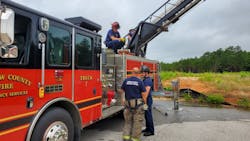As a new firefighter, you want to learn as much as possible about your new career so you can become the best firefighter possible. You had your basic training, but now it’s time to really learn the job.
You follow and study the company officer as much as possible. You listen to the boisterous members of the crew describing the calls that they responded to over the years. You read trade magazines to gain additional knowledge. However, there is one valuable source of information you might have overlooked.
As a newly promoted officer, you quickly will realize that the duties and responsibilities of a company officer can be very demanding and that to be successful you must rely on your experience and training. However, you also need help from your crew to succeed at the position, and you must find someone you can trust to do what needs to be done—perhaps someone you might have overlooked.
Who is this mysterious, often overlooked person who the rookie and the new officer should gravitate toward? Look around your department. It could be the firefighter standing in the kitchen telling everyone about new training techniques. It could be the senior firefighter in the dayroom talking about “the big one” from 20 years ago. Most likely, though, it’s the “quiet” firefighter who currently is out of sight, diligently working on the tools in the apparatus bay.
Walk the walk
The quiet firefighters are the ones who, when it’s time for the shift to start, already are out with a cup of coffee checking on their apparatus. When training happens, they are the ones who take it and learn from it and place it in their knowledge base. When the fire occurs, they are the first ones in the door and ready to go to work. What makes them different is they just do it. They don’t come back from a call or training and spend the next few days telling everyone they meet what they did. They don’t post all over social media for folks to see what they did. They just do the job with no fanfare.
These quiet firefighters usually are highly trained and motivated. What makes them different is they get their motivation from inside themselves. They know that the job has dangers and can be mentally and physically exhausting, and, therefore, they want to be prepared. They quietly walk the walk and let others talk the talk. They are more than willing to help others learn the trade and continually work on honing their skills. When given an assignment, they will complete it and be ready for the next one. They will help shape the department if you ask them to; they just won’t talk about it.
They are the ones who are out in the dark using spotlights as they grease the aerial. More often than not, they are the ones who make the rescue in a fire and turn right around and go back in. When someone asks who made the grab, they don’t say anything, because they didn’t do it for the glory. They did it because it’s their job.
Quiet firefighters can be young or old. They can have only a few years in or have been doing it for 30 years. They rarely complain about the job or what they’re asked to do. However, when you watch them, you realize how much they really know and how much they bring to your crew. You also see the passion they have for the job and realize that passion isn’t about talking; it’s about doing. Hopefully, you start to truly value them in their quietness and realize that they are the leaders in their own way. They are the ones you should gravitate toward.
Use them
As a rookie, find that quiet firefighter and become a sponge. Absorb that individual’s knowledge—and even quietness—as that person helps you to learn your craft. Quiet firefighters also listen to you as well. They realize you just came through basic training and can have something to offer in building a foundation of skills for the whole crew. After all, you just learned the latest and greatest techniques.
As a company officer, find that quiet firefighter and utilize that person to the fullest. You will see that the individual gets satisfaction from being asked to share skills, training and experience. The quiet firefighter enjoys sharing with others, but he/she just won’t force it on the crew. Quiet firefighters aren’t shy; they just prefer their work to speak for them. Listen to them when they say “Hey, Cap, what do you think about this?”
As a chief, look for that quiet firefighter. While the others might be doing a lot of talking, that quiet one might just be the leader you are looking for. The quiet firefighter is the rock of your department who quietly does the job well and mentors many in your department if the others are smart enough to ask them. They are the ones who are great at the job and will be great officers.
Let’s not overlook the quiet firefighters just because they are quiet.
About the Author
Scott Dakin
Scott Dakin is a captain with Barrow County Emergency Services in Georgia, currently assigned to Truck 7. He has been a firefighter for more than 25 years. He holds numerous fire officer certifications and is a certified emergency manager. He serves as the department's public information officer and the Critical Incident Stress Management team coordinator. As an instructor, Dakin has taught on numerous subjects around the country and internationally. Dakin started his career as a volunteer firefighter and EMT.

